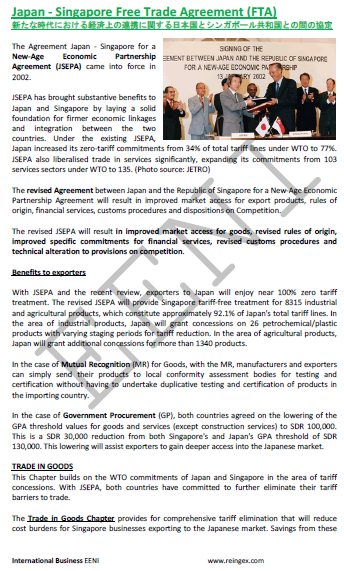Japan-Singapore Agreement

Japan-Singapore Free Trade Agreement
- Introduction to the Japan-Singapore Agreement
- Review of the Singapore-Japan Agreement
- New-Age Economic Partnership Agreement
- Foreign Trade in Goods, Services, and Investment
- Rules of Origin
- Asia-Africa Corridor
- 新たな時代における経済上の連携に関する日本国とシンガポール共和国との間の協定

The Subject “Japan-Singapore Free Trade Agreement” belongs to the following Online Programs taught by EENI Global Business School:
Masters: International Business, Foreign Trade.
Courses: Taoism, Confucianism & Business, Buddhism and Business.

Japan-Singapore Free Trade Agreement.
The Japan-Singapore Agreement for a New-Age Economic Partnership Agreement came into force in 2002.
The revised agreement between Japan and Singapore for a New-Age Economic Partnership Agreement will result an improved market access for the export products, rules of origin, financial services, customs procedures, and dispositions of competition.
The Japan-Singapore Free Trade Agreement covers:
a) Trade Liberalization and Facilitation between Japan and Singapore.
- International trade in goods
- Rules and certificate of origin
- Customs Procedures
- Mutual Recognition Agreement
- International Trade in Services (Financial, Courier, and Telecoms Services)
- FDI
- Movement of Persons
- Government Procurement
b) Partnership and Cooperation between Japan and Singapore.
- Customs Procedures
- Paperless Trade
- IPR
- Competition Policy
- Financial Services
- Information and Communications Technology
- Science and Technology
- Human Capital Management
- Trade and foreign direct investment promotion
- Development of Small and Medium-sized Enterprises
- Broadcasting
- Tourism
The Japan-Singapore Economic Partnership Agreement operates within the Buddhist Civilization.
Japan-Singapore Free Trade Agreement (FTA)

(c) EENI Global Business School (1995-2024)
We do not use cookies
Top of this page




 (or
(or 

 ).
).